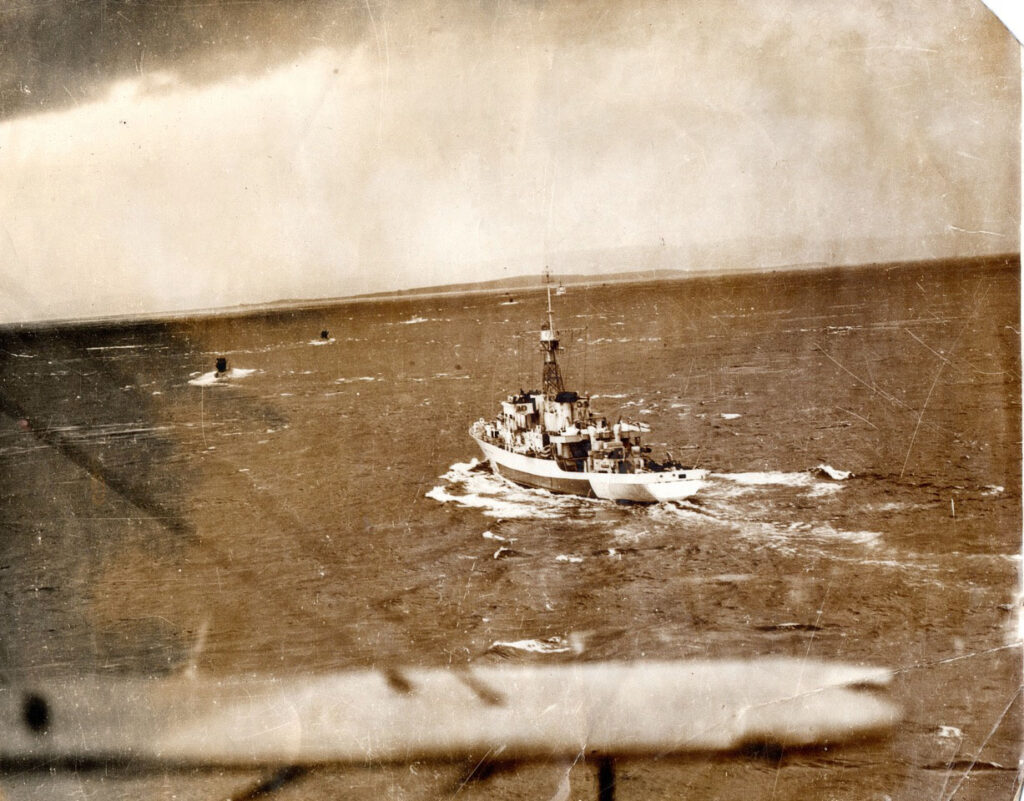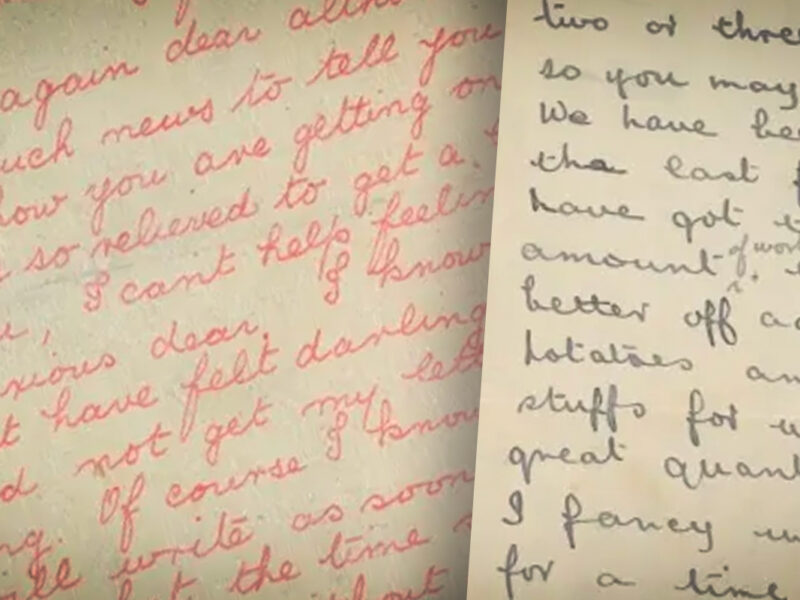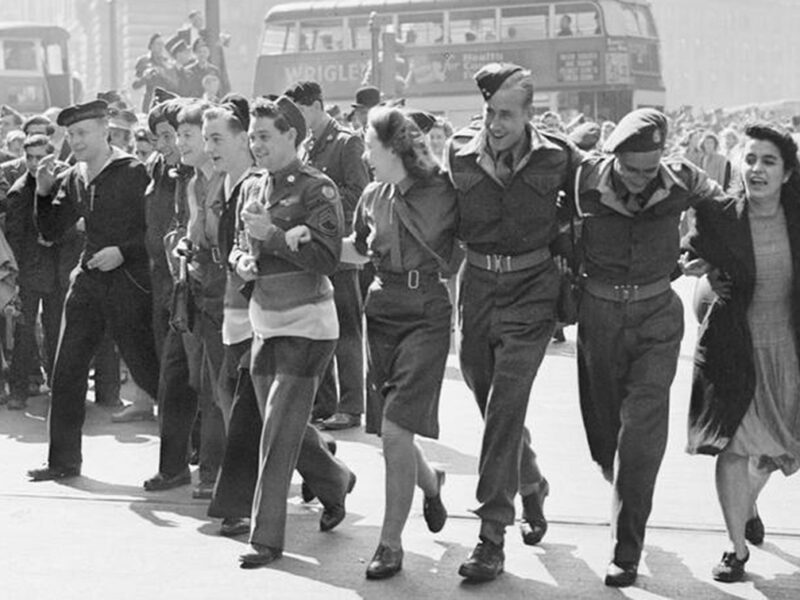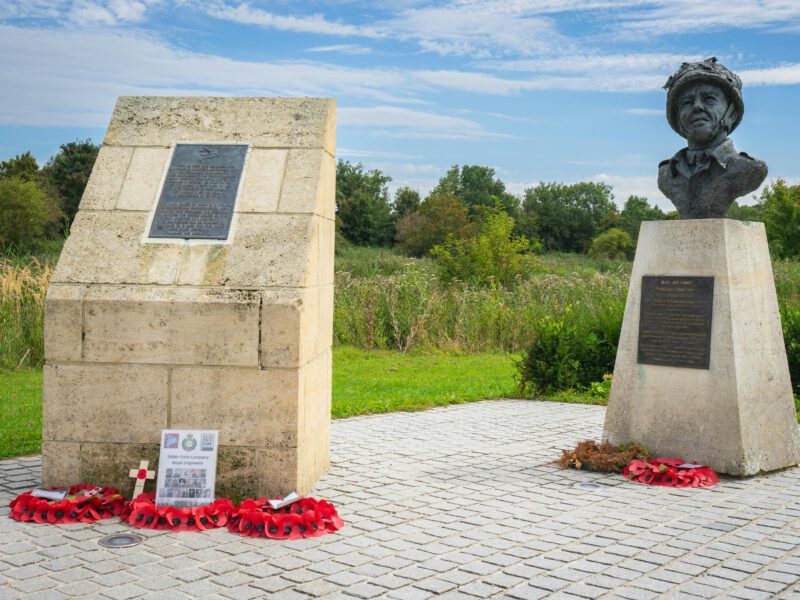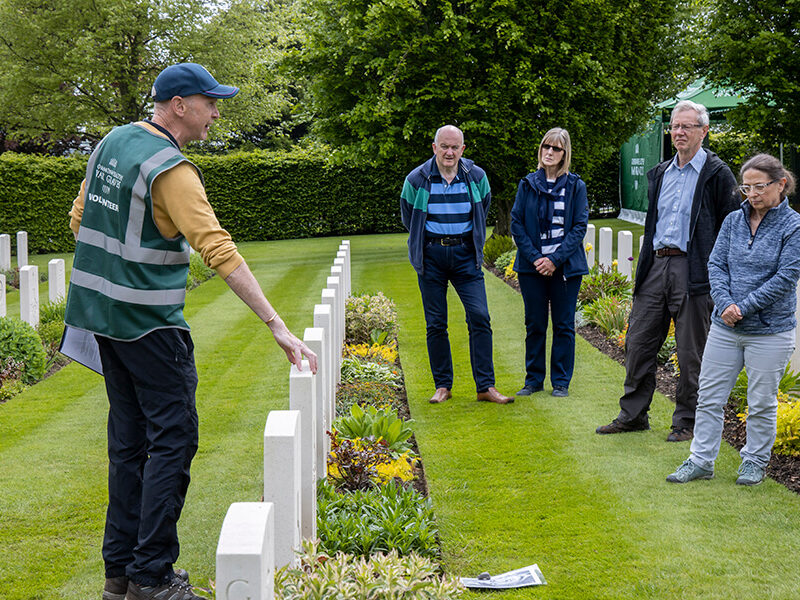My father wrote this eyewitness account of liberation in Bergen, Norway, just after VE Day.
He was serving on HMS Launceston Castle and was able to write home with these details following the lifting of censorship. He sent it home intending it to be read by my mother and his wider family in Somerset. The handwritten letter was quickly typed up by his sister (my aunt) Nancy and that is the copy attached here.
H.M.S. “Launceston Castle”,
C/0 G.P.O.s
London.
29.5.45.
You may be surprised to know that I am in Bergen in Norway. We missed all the VE day celebrations owing to the fact that we were at sea, but they have given us a very sincere welcome here and the general air of festivity gives us a good idea of what things were like at home. This place is the most beautiful port I’ve ever entered. To get here it is necessary to come about 15 miles through the fiords. The mountains are very steep and high and everything is a beautiful green colour. The houses are very spick and span and look like very new doll’s houses at the edge of the water. The sun only goes down for a couple of hours at this time of year and it is never really dark. In spite of being fairly well north it is a very warm and sunny sort of climate with very clean, bright air. The smell of the pines on the mountains comes down into the city and docks and the whole place is very pleasant to be in.
We came up the fiords at about eleven in the evening (the sun still shining brightly!) and at all the little villages the people turned out to cheer wearing very brightly coloured national costumes and waving the Norwegian flag. They even barred our progress at one stage, while they all came out in boats and clustered round, waving, and cheering. I’ve cursed myself time and again for not having brought my camera this trip, but there it is. I won’t forget it for a long time anyway!
On Sunday the ships were open to the public and half Norway came down and swarmed aboard. They don’t look as though they starve, but things are pretty tight, the chief diet being fish and vegetables, the latter not too plentiful. The children in some cases have never seen chocolate or sweets and when I came into my cabin after a run ashore one little chap followed me in and said “Shokolada ja?” and so I managed to find a bar. When I’d produced it, five little girls with very fair pigtails had appeared and were giving me the glad eye. I took them down to the wardroom to get a knife to cut the bar into six and having done so, found there were fifteen there. The situation then got out of hand so I gave a drink of lime juice to those who hadn’t had a piece of “Shokolada”. Like a flash about thirty-five more people appeared, including a selection of beaming Russians and a few French and Belgians thrown in, not to mention Norwegians. We tactfully shooed out the adults and kept the kids!
Down in the mess decks was a scene I’ll never forget. All the lads did without their supper and entertained the kids. Rows of fair haired little girls and boys were steadily putting away colossal meals and ate until they fairly bulged and the chat was terrific. Sailors here have been generally adopted by the kids and it is a very common sight to see an AB with a child on either hand, walking along the front. They seem to be honorary Norwegians themselves at present!
The military situation is quite funny here. There are about twenty seven thousand Germans, all armed (for self-protection against the civilians!) and if you board a tram, you will probably have a big Russian slave labourer (there are thousands of these) on one hand and a German on the other! The Germans have, for the most part, withdrawn into their barracks and occasionally you see a sentry outside. They are now being hoofed out of all the public buildings they have occupied and are being disarmed and sent away -I don’t know where, but I know they don’t want to go to Russia!
There was great rejoicing yesterday when British Airborne troops arrived and a pipe band played them in. They look three times as smart as the Germans, who seem to have abandoned any pride in their appearance. As far as I can gather, they have behaved fairly well here, but the Gestapo have done some dirty work to the people who kept their wireless sets and in general there has been a lot of pettifogging officialdom and restriction of individual liberty, not to mention near starvation.
They have built enormous U-boat shelters here. I’m hopinq to get a look at these before we leave. The roofs consist of about thirty feet of solid reinforced concrete and bombing can’t have hurt them much, The town has suffered very little damage from bombing„ although the R.A.F. often came but they kept strictly to military targets and their work is pretty accurate. The biggest disaster occurred when a German ammunition ship blew up and destroyed quite a big area on the waterfront about two years ago. The U-boats here are gradually being taken over by British submarines and so it looks as though I shan’t be doing this job again! Their new U-boats are pretty slick looking jobs and could have done a good deal of damage, had the war continued longer.
One thing drives home the kind of life the people have led for the past few years. Every night at about ten o’clock the city squares are absolutely filled with people, listening to the public wireless set. I had grown so used to hearing the news at home, that this sort of thing drove it home to me very forcibly.
Just prior to writing this letter he had written another eyewitness account of having been put in charge of surrendering U-boats in the North Atlantic and taking them into Loch Alsh for de-arming. This includes an account of conditions on board and the morale of the crew having surrendered, and my father’s feelings of vulnerability being the only RN officer on board.
H.M.S. “Launceston Castle”
C/o G.P.O.
London
24th May, 1945
Censorship is now removed in Home Waters and so I can tell you of a recent experience of mine which is a bit novel in our family!
We are at Loch Eriboll, up in the North West of Scotland and have been coping with the U-boats as they surrender. They come here first and then go on to Loch Alsh to be disarmed and then to a laying-up port. You can judge of my surprise when I found myself C.O. of the armed guard on U-295, charged with the safe delivery of the said U-boat at Loch Alsh.
On the whole they were a tame enough lot, but I didn’t much care for the look of some of the Jerries and kept pretty wide awake all the time. Naturally my presence in the U-boat was resented and I felt that the situation could become sticky if I made a false move. However all went well and the submarine was delivered complete and without snags to my great relief. My job was to direct the Captain of the U-boat in every respect and he in turn relayed my orders to the appropriate quarters. As you are aware, my German is almost non-existent and my chief worry was lest he should deliberately foozle his wheel and engine orders when coming alongside and perhaps ram the depot ship and do a good deal of damage to both ships. This I did by trying to look as menacing as possible and standing directly behind him during all manoeuvres.
The guard consisted of nine of our ratings and myself and these were posted in various positions throughout the U-boat. I took the keys of all flooding vents in order to prevent them scuttling the ship and those below kept a strict eye on the situation, with a couple of tommy-guns to add weight to their presence!
The interior of the U-boat was unspeakable and I still have the stench of it in my nostrils. The living space was of about the same dimensions as your upstairs landing at Mill House and this housed fifty two people, mostly big bulls of Germans who slept in their clothes- and even wore sea-boots in their bunks. They had been out on an operational trip and returned to Narvik on the 7th. They weren’t allowed ashore and found the flags out on arrival. A couple of days later they came to Trondheim and thence to Loch Eriboll under escort. This meant that none had enjoyed a bath, or even a fairly comprehensive wash for about six weeks.
On bits of piping etc. hung lots of sausages of colossal dimensions and -those sweated add dripped in the heat and the stench. The galley was about as big the airing cupboard at Mill House and contained a small electric cooker and odd items of cooking equipment. There appeared to be no routine for meals. Occasionally a Jerry would barge in and seize a frying pan and a lump of lard. He would melt the lard and dip bread in it and having consumed this interesting meal, would lie down and snore loudly. Opening off the galley (lovely planning this!) was the crew’s lavatory. This resembled those on railways and received about two thousand times the use. All this gave me a rare appetite for any food cooked there! I organised things so that we supplied all our own utensils and food and water and left the whole lot in the open air when not actually being cooked.
This particular U-boat hailed from Bremen and had been attacking Arctic convoys to Russia since about a year ago. They had operated from Narvik in Norway and hadn’t been to Germany since. There was no evidence of Hitler worship on board. All salutes were ordinary naval salutes and the only pictures of celebrities were two, both of Doenitz. I gathered from them that he still enjoys considerable prestige, at any rate in Naval circles.
The officers were a mixed lot, The captain was a professional seaman, who served in sailing ships before the war and certainly knew his stuff. Their first lieutenant was a bit of a newcomer to U-boats. He had been an artillery officer in the coastal batteries at Boulogne. He got a bit fed up with this and volunteered for U-boats. He had just done quite a lot of courses and his first operational trip. He was a chemist in civil life and seemed to be rather out of his depth at the job.
The next one was bit of a swell in his way being the only ”von” in the ship and came (of all places) from the Austrian Tyrol. This chap seemed to be the clean type to be found in the Tyrol and he viewed the mountains of Skye with a pretty professional eye, I thought. I couldn’t help thinking what a contrast he must have found, in that filthy little tube when comparing it with the air and space he must have been used to. Afterwards I found that there was a sort of family tradition involved, since his father had been an officer in the old Imperial Austro-Hungarian Navy, before it packed up altogether. The rest seemed to hold this chap in very high regard.
There was another rather ordinary sort of chap and then the two engineer officers. The first of these was a tall, thin, willowy looking blond, who seemed easily cowed, and the second, a kid of about twenty, who had a nasty look in his eye. I took pretty good care to see that he did no mischief. He seemed the right type to qualify as a sort of “werewolf”.
All except the Austrian were keen to know whether they were going to be sent to Russia or not, since they dread that above everything else. I kept their behaviour pretty good by giving them to understand that I had power to recommend that they take a trip to Russia or otherwise! About the biggest fib I’ve ever told – or rather acted since I didn’t ever say as much, but it served a very good purpose!
Amongst the armed guard, I had an old Devon leading seaman and during the journey to Loch Alsh in the middle of the night I heard a good old West Country voice at the back of the conning tower observing that “he’d bin lookin’ for these bastards for five and a half years but he never thought he’d be ridin’ roun’ in one!”
This journey was a cold and miserable affair. I had to spend the entire time (about 12 hours) on the conning tower making sure that the U-boat kept station with the rest and generally did as she was told by the escort. In any sort of sea these things are very wet and I was more than glad to find a relief guard all ready on arrival at Loch Alsh.
This stage of the business I shall always remember. There were many U-boats there alongside the depot ships. Their crews were removing torpedoes and ammunition etc. and as soon as this job Was done, they would fall in on the casing of the U-boat and their C.O.s would make a speech in German and dismiss them. There would then be a lot of hand-shaking and exchanging of cigarettes etc. The ratings seemed quite happy that it should all be over and some of the officers too, but the dyed-in-the-wool Nazi officers of whom I saw one or two were weeping with frustration. I had none of these on U-295 as far as I could tell, but they knew that on their way to Loch Alsh they would be keeping their last sea watches and as each relieved the other they would salute and shake hands. I was pretty weary with my all night session and the whole thing now seems like a very theatrical dream!
The Officer in Charge up here has distributed mementos of the occasion and I have a pair of binoculars as my bit of loot. They are big and clumsy but very powerful and may be useful for rides in the car in the days to come. And when I take them out I shall always smell that combination of stale sweat, fuel oil, and sauerkraut which pervaded the thing, so I don’t suppose it will be a great asset to have them after all!
One impression I’ve gained, and whether it is a misleading one will take years to tell. I’ve not seen one picture of Hitler, or any of the Nazi party. The only portraits were two, both of Doenitz who still enjoys great prestige. I believe that but for this all U-boats would have been scuttled, but they were ordered to surrender and, being Germans, and used to obeying orders, they have complied.
One thing I saw which makes me think that perhaps Hitler wasn’t taken quite as seriously as we thought, at any rate in the German Navy. You will remember that he was (or is?) a great Wagner fan. In U-295 there is a cartoon, framed, depicting a dying Isolde on the stage and the whole audience in various stages of hysteria. I have wondered whether this is a dig at Hitler. There is no inscription beneath it to indicate anything.
Scourse letters

